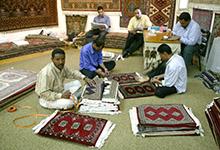
Typical street scene in Santa Ana, El Salvador. (Photo: iStock)
IMF Survey : Experts Outline Vision for Private Sector Development in Mideast
December 18, 2013
- Region’s key challenge is to create inclusive, private sector–led growth
- Conference highlights challenges and best practices in private sector development
- More investment, macroeconomic stability, diversification, trade are needed
Countries of the Middle East and North Africa should carry out significant reforms to lay the foundations for sustainable and inclusive growth led by the private sector, participants at a conference in Riyadh, Saudi Arabia said.

Carpet factory, Egypt. Small and medium–sized firms remain the main engine of jobs and growth in the Middle East (Photo: Pascal Deloche/Newscom)
Conference on Private Sector in Mideast
The December 3 conference entitled “The Private Sector in the Middle East—How Can It Contribute More to Growth?” sought to assess the role the private sector plays in the region, discuss the barriers it currently faces, and identify the policy reforms needed.
The event—cohosted by the IMF, the International Finance Corporation, and the Council of Saudi Chambers—brought together private sector business people, representatives of international organizations, and academics from the region and elsewhere. It highlighted successful experiences with private sector development in the Middle East, as well as best practices and experiences from other regions.
“The conference provided a unique opportunity to hear first hand from the business community, whose role is crucial for progress and economic development in the region,” said IMF Deputy Managing Director Min Zhu. This input can better guide policy advice to governments looking for ways to reduce the unacceptably high rates of unemployment, especially among youth, he added.
Challenges facing private sector
Conference participants pointed to several challenges facing the private sector in the Middle East and North Africa and why it has grown slower than in dynamic emerging markets.
Most countries of the region, especially oil importers, are characterized by relatively low levels of investment, weak labor productivity growth, and an underdeveloped financial sector. Trade remains underutilized as a means to promote growth, and the business environment remains relatively weak with corruption an issue in some parts.
The reliance on natural resources in some countries, especially oil exporters, may have reduced the incentives for economic diversification, while the presence of a large informal economy has contributed to less inclusive growth opportunities. Slower growth has meant that high unemployment, especially among the youth, remains a challenge in the face of a rapidly expanding labor force, said conference participants.
“Improving the business environment, revamping the infrastructure, easing access to finance, and facilitating the public-private partnership would provide an enabling environment for private sector growth,” Ibrahim Al-Assaf, Saudi Arabia’s Minister of Finance, told the conference. Fadi Ghandour, founder and CEO of Aramex in Jordan, reminded the conference audience of the importance of small and medium-sized enterprises as the main generator of jobs and growth in the Middle East and North Africa.
Role of macroeconomic policies
A stable economic environment and a robust financial system are necessary for private sector growth. Low inflation and limited year-to-year variability in economic growth create certainty for businesses, and encourage them to invest and create jobs. However, an examination of data over the past decade reveals that macroeconomic volatility has been high in many parts of the Middle East and North Africa.
Credible monetary policy can help deliver low inflation. In addition, sound fiscal policies can create space for governments to be able to support the economy when it is weak and, hence, reduce economic volatility, the conference heard.
The financial sector in the region appears robust in general, yet credit availability to the private sector remains an issue for most countries. Financial sector reform should aim at improving access to finance and enhancing financial sector competition. “There needs to be financial inclusion that focuses on Saudis who do not have access to funding,” said Fatin Bundagji, a board member, Jeddah Chamber of Commerce and Industry.
If the region’s policymakers succeed in implementing these reforms, participants said, the financial systems should be in a much better position to support the investment needed for growth.
International experiences
Discussions drew on international experiences. Participants observed that fast-growing economies with vibrant private sectors are usually associated with disciplined macroeconomic policies, strong private investment and savings, development of competitive high value–added industries, and strong accountable institutions that create a pro-investor environment.
Moreover, long lasting growth is associated with strong economic fundamentals, including human capital investment, strong regulatory frameworks, and governance.
Participants agreed, however, that no one recipe for success exists, though countries of the region can draw lessons from experiences in other countries. The Korean experience in developing the private sector was especially featured during the conference.
Private sector and inclusive growth
Conference participants agreed that creating jobs for a rapidly growing and young population in a sustainable way will be necessary to ensure that growth is inclusive. A more dynamic private sector will be central to achieving this.
At present, the lack of integration with regional and global markets is likely limiting growth and employment opportunities. Meanwhile, the effects of inefficient labor market and education policies and unequal access to government services and credit may affect how different people benefit from economic opportunities.
Conference participants agreed that business people need to be seen as part of the solution rather than as part of the problem. This implies overcoming vested interests to harness the ingenuity of the private sector and open opportunity for all.


